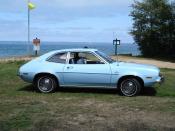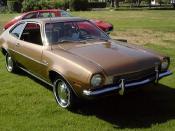In 1971, a Ford Pinto was introduced that weighed less than 2000 pounds and priced at less than $2000. The car needed to be produced in 25 months rather than the usual 43 months to keep costs low. The rear end impact was not tested until after it was produced due to the accelerated production schedule, although Ford engineers knew that testing for rear-end impact is a standard safety procedure. After production the Pinto was tested, and it failed the test, meaning that it fell below the state of the art for cars of that size. The fuel tank was placed close to the bumper and if it was hit from the rear at a speed of 20 miles per hour it could be hit by a bolt and could possibly burst into flames. A baffle was considered to make the Pinto comparable to other cars in its class. The company decided not to add the baffle because they thought it would cost the company a lot less.
The style was not changed from 1971-1978 and it didn't offer the customers the option to add the baffle. Suits were brought against Ford, which cost Ford far more than what it saved by not correcting the defect. There were thirteen fiery rear-end collisions. The cars were recalled in 1978 to insert the baffle after many people were injured and dead.
If Ford would've gone ahead and made the changes it would've made the Pinto safer. Just because there was no National Highway Traffic Safety Administration rear-end impact standard at the time and it was legal doesn't always mean it's ethical. The bad definitely out weighed the good in this situation. I think it's unethical that human lives can be taken or serious injuries can occur because it may cost a few...


